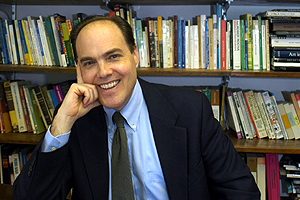
Yale University, PhD '09
BIOGRAPHY
I am an historian of modern Russia, with a special interest in nineteenth- and twentieth-century politics, culture, and ideas. My work explores how Russia's peculiar political institutions—and its status as a multiethnic empire—shaped public opinion and political cultures. It also interrogates Russia's relationship with the outside world, asking where the Russian experience belongs in the broader context of European and global history. In addition, I am interested in the theory and practice of the digital humanities.
I am currently working on a new history of the origins of the Protocols of the Elders of Zion written for a popular audience. This book offers a new account of how this notorious text came to be, and it asks what history's greatest conspiracy theory can tell us about the present moment, when conspiratorial thinking is again on the rise in society and politics.
My most recent book, Utopia’s Discontents: Russian Exiles and the Quest for Freedom, 1830–1930, was published by Oxford University Press in 2021. It is the recipient of the 2022 Wayne S. Vucinich Book Prize from ASEEES, which recognizes the most important contribution in any discipline of Slavic studies. The book provides the first synthetic account of Europe's "Russian colonies"—boisterous and politically fractious communities formed by exiles from the Russian empire that emerged across the continent in the nineteenth and early twentieth centuries. The book treats the "Russian colonies" as utopian communities in which radical activists worked to transform social relations and individual behavior, and it explores how these unique spaces influenced Russian political imaginaries as well as the culture of their host societies. Ultimately, the project offers a bold reassessment of Russia's relationship with Europe, the origins of the Russian revolution, and the creation of the Bolshevik regime.
My first book, Children of Rus’: Right-Bank Ukraine and the Invention of a Russian Nation, was published by Cornell University Press in 2013 and released in paperback in 2017. Children of Rus' argues that it was on the extreme periphery of the tsarist empire—a region that today is located at the very center of the independent nation of Ukraine—that Russian nationalism first took shape and assumed its most potent form. The book reconstructs how nineteenth-century provincial intellectuals came to see local folk customs as the purest manifestation of an ancient nation that unified all the Orthodox East Slavs, and how they successfully propagated their ideas across the empire through lobbying and mass political mobilization. In addition, it reconceptualizes state-society relations under tsarism, showing how residents of a diverse and contested peripheral region managed to shape political ideas and identities across Russia—and even beyond its borders. Children of Rus' was named a Choice Outstanding Academic Title for 2013.
My current research is enriched by technology, and I am interested in thinking through how historians can use digital tools to open new avenues for exploration and to communicate their findings to other scholars and the general public. I am particularly interested in using geo-spatial analysis to analyze flows of people, ideas, and commodities over time and across space. For examples of my (ongoing) work in digital cartography, see my Utopia's Discontents website in development and my study of émigré publications.
I have held research fellowships at Columbia, Harvard, and the Cullman Center for Scholars and Writers at the New York Public Library. My research has been funded by ACLS, IREX, Fulbright-Hays, and the NEH.
I am represented by Kathleen Anderson (kathleen@andersonliterary.com) of Anderson Literary Management.
Recent Research / Recent Publications
- Utopia’s Discontents: Russian Émigrés and the Quest for Freedom, 1830s-1930s, Oxford University Press, 2021. Awarded the 2022 Wayne S. Vucinich Prize.
- "'The Franco-Russian Marseillaise': International Exchange and the Making of Anti-Liberal Politics in Fin-de-Siècle France." Journal of Modern History 89, no. 1 (Mar. 2017): 39–78.
- "Children of Rus’: Nationalist Imaginations in Right-Bank Ukraine." In The Future of the Past: New Perspectives in Ukrainian History, edited by Serhii Plokhy. Cambridge, MA: Harvard University Press, 2016.
- "Making and Breaking the Russian Empire: The Case of Kiev’s Shul’gin Family." In Imperiale Biographien: Elitekarrieren im Habsburger, Russischen und Osmanischen Vielvölkerreich (1850–1918), edited by Malte Rolf and Tim Buchen, 178–98. Munich: Oldenbourg-Verlag, 2015.
- "Intimacy and Antipathy: Russian-Ukrainian Relations in Historical Perspective." Kritika 16, no. 1 (Win. 2015): 121–28.
- Children of Rus': Right-Bank Ukraine and the Invention of a Russian Nation. Ithaca, NY: Cornell University Press, 2013.
- "Modernist Visions and Political Conflict in Late Imperial Kiev." In Races to Modernity: Metropolitan Aspirations in Eastern Europe, 1890–1940, edited by Jan C. Behrends and Martin Kolrausch. New York: Central European Press, 2014.
- "Ukrainophile Activism and Imperial Governance in Russia's Southwestern Borderlands." Kritika 13, no. 2 (Spr. 2012): 301–26.
- "Migration, Mobility, and Political Conflict in Late Imperial Kiev." In Russia on the Move: Essays on the Politics, Society and Culture of Human Mobility, 1850–Present, edited by John Randolph and Eugene Avrutin. Urbana: University of Illinois Press, Studies of World Migrations Series, 2011.
- Writes op-ed on seizing Russian oligarchs' wealth for The Atlantic
- Interviewed for Meduza on Putin's presentation of Ukrainian and Soviet history
- Quoted in USA Today article on how historians see the invasion of Ukraine
- Quoted in Politifact on the history of Russian imperialism
- Interviewed for The World on the entangled histories of Russia and Ukraine
- Writes op-ed on immigration for The Washington Post
- Quoted in Chicago Tribune article on the meaning of "concentration camp"
- Named a 2018–19 Cullman Center Fellow at the New York Public Library
- Review of AHA session on "History and Historians in the Ukraine Crisis" by Sarah Fenton
- Quoted in National Geographic article on Ukrainian-Russian conflict
- Children of Rus' reviewed in the Moscow Times

Stanford University, PhD '86
Prof. Borges has retired and no longer directs BA theses or accepts new graduate students.
BIOGRAPHY
Dain Borges works on nineteenth- and twentieth-century Latin American culture and ideas. His current research project, "Races, Crowds, and Souls in Brazilian Social Thought, 1880–1920," centers on the ways in which Brazilian intellectuals used race sociology and social psychology to understand popular religion and politics. He teaches seminars and courses on Latin American history, comparative nineteenth-century transformations, ideologies of national identity, and culture in the African diaspora.
Recent Research / Recent Publications
-
“Mockery and Piety in Eça de Queirós and Machado de Assis.” Revista de Estudos Literários [Coimbra] (2016).
-
“Catholic Vanguards in Brazil.” In Local Church, Global Church: Catholic Activism in Latin America from Rerum Novarum to Vatican II, edited by Stephen J. C. Andes and Julia G. Young. Washington, DC: Catholic University of America Press, 2015.
-
"Healing and Mischief: Witchcraft in Brazilian Law and Literature, 1890–1922." In Crime and Punishment in Latin America, edited by Carlos Aguirre, Gilbert Joseph, and Ricardo Salvatore. Durham, NC: Duke University Press, 2001.
-
Esau and Jacob, by Machado de Assis. New York: Oxford University Press, 2000 (editor).
-
"A Mirror of Progress." In The Brazil Reader: History, Culture, Politics, edited by Robert M. Levine and John J. Crocitti. Durham, NC: Duke University Press, 1999.
-
"Intellectuals and the Forgetting of Slavery in Brazil." Annals of Scholarship 11 (1996).
-
"The Recognition of Afro-Brazilian Symbols and Ideas, 1890–1940." Luso-Brazilian Review 32 (1995).
-
"Puffy, Ugly, Slothful, and Inert: Degeneration in Brazilian Social Thought, 1880–1940." Journal of Latin American Studies 25 (1993).
-
The Family in Bahia, Brazil, 1870–1945. Stanford: Stanford University Press, 1992.
-
Discusses "Natural Disasters and Social Responses" at the Summer Teacher Institute, University of Chicago [video, 50 mins]